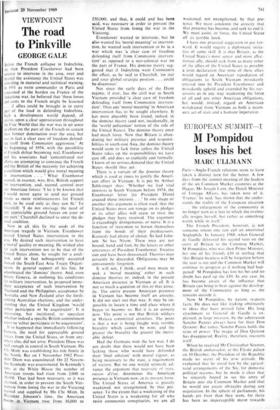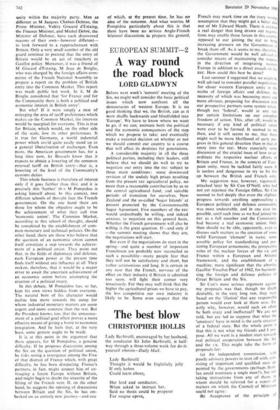EUROPEAN SUMMIT --1 '
M Pompidou loses his bet
MARC ULLMANN
Paris—Anglo-French relations seem to have taken a distinct turn for the better. A few days from the summit meeting of the leaders of the six Common Market countries at the Hague, Mr Joseph Luns, the Dutch Minister of Foreign Affairs, has taken note of it. 'France,' he said, 'has shown that she under- stands the reality of the European situation . . . the enlargement of the community is no longer seen as a fate to which she eventu• ally resigns herself, but rather as something worth while in itself.'
The French President, however, is not someone whom one can call an emotional Anglophile. In January 1968, when General de Gaulle delivered his second veto on the entry of Britain to the Common Market, M Pompidou, who was then Prime Minister, bet one of his friends £10 in sterling that 'this Britain business will be forgotten before the year is out and the Common Market will continue its progress as if nothing had hap- pened'. M Pompidou has lost his bet and no doubt has paid up the £10. In any case, he has become aware of the influence that Britain can bring to bear against the develop- ment of the Community as long as she remains outside it.
Now M Pompidou. by nature, respects facts. He does not like sticking obstinately to ideas that have proved false. His long attachment to General de Gaulle is ex- plained, in large measure, by the admiration Sancho Panzas always have for their Don Quixote. But today, Sancho Pania holds the reins of power. The magic of Don Quixote has disappeared. Reality, therefore, reasserts itself.
When he received Mr Christopher Soames, the British ambassador, at the Elysee palace on 10 October, the President of the Republic made no secret of his n-w- attitude. He explained that he stood fast by the agricul- tural arrangements of the Six, for domestic political reasons, but he made it clear that he sincerely hoped to see the entry of Britain into the Common Market and that he would not create obstacles during any negotiation. In the sphere of parliament, his hands are freer than they seem, for there has been an imperceptible move towards
unity within the majority party. Men as different as M Jacques Chaban-Delmas, the Prime Minister, Valery Giscard d'Estaing, the Finance Minister, and Michel Debra, the Minister of Defence, have each discovered reasons of their own—however different— to look forward to a rapprochement with Britain. Only a very small number of the old guard continue to pretend that the entry of Britain would be an act of treachery to Gaullist policy. Moreover, it was a friend of
M Giscard d'Estaing, M Jean de Broglie, who was charged by the foreign affairs coma mittee of the French National Assembly to prepare a report on the problem of British entry into the Common Market. This report was made public last week. In it, M de Broglie considered that 'for France and for the Community there is both a political and economic interest in British entry'.
But why? If it were simply a case of enlarging the area of tariff preferences which makes up the Common Market, the interests would be marginal for everyone. This is true for Britain, which would, on the other side of the scale, lose its other preferences. It is true for Germany, a world industrial power which could quite easily stand up to a general liberalisation of exchanges. Even more, the American government has, for a long time now, let Brussels know that it expects to obtain a lowering of the common external tariff on British entry—that is, a lowering of the level of the Community's customs duties.
This whole business is therefore of interest only if it goes further than this: and it is precisely this 'further' thlt M Pompidou is asking himself about. In this context, two different schools of thought face the French government. On the one hand there are those for whom the objective ought to be the achievement of what they call true `economic union'. The Common Market, according to this school of thought, should be completed by the establishment of com- mon monetary and technical policies. On the other hand, there are those who believe that the question of an economic union cannot itself constitute a step towards the achieve- ment of a political union. They point out that, in the fields of diplomacy and defence, each European power at the present time finds itself without any influence at all. They reckon, therefore, that it would be a major error to await the uncertain achievement of an economic union before attempting the creation of a political treaty.
In this debate, M Pompidou has, so far, kept his own views hidden from everyone. The natural bent of his character would incline him more towards the camp for whom industrial monetary matters are more urgent and more concrete than the rest. But the President knows, too, that the announce- ment of a political goal often proves a more effective means of giving a boost to economic integration. And he feels that, at the very least, some gesture ought to be made.
It is at this point in the argument that there appears, for M Pompidou, a genuine difficulty. If he proposes discussions among the• Six on the question of political union, he risks seeing a resurgence among the Five of that distrust of France which, with great difficulty, he has been dissipating. France's partners, in fact, might suspect him of en- visaging a future Europe without Britain, and might begin to doubt the sincerity of the lifting of the French veto. If, on the other band, he suggests the opening of discussions between Britain and the Six, he has em- barked on an entirely new journey—and one
of which, at the present time, he has no idea of the outcome. And what worries M Pompidou particularly about this is that there have been no serious Anglo-French bilateral discussions to prepare the ground;











































 Previous page
Previous page